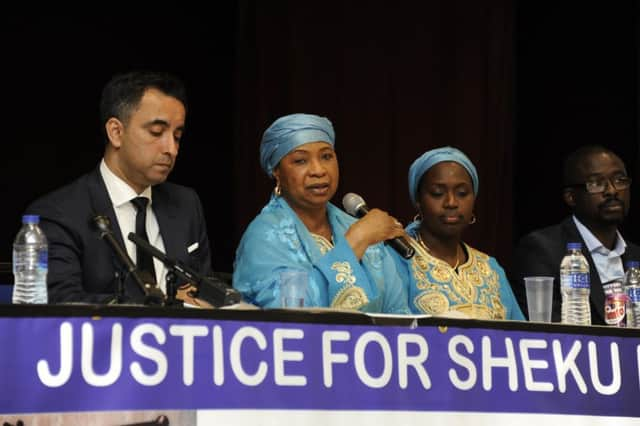Leaders: Due process needs to be followed in Bayoh case


Few can have failed to notice the coverage of the Sheku Bayoh case, with his family and campaigners demanding to know exactly what happened a year ago today when Mr Bayoh died in police custody.
But comparing the Bayoh case with the handling of the Hillsborough disaster is to attempt to draw a parallels between two unconnected events. This kind of approach is rarely effective, yet it is what the family’s lawyer Aamer Anwar has done in a statement to mark the first anniversary of Mr Bayoh’s death.
Advertisement
Hide AdAdvertisement
Hide AdMr Anwar talks about the Bayoh family’s meetings with “families who have also lost loved ones at the hands of the police”.
He said: “As we have seen from Hillsborough, it is instinctive for police officers to blame the dead rather than their own and for families to be placed in the perverse situation of relying on the police for the truth.”
The full facts of what happened a year ago in Kirkcaldy are still under investigation.
The tragedy of Hillsborough finally came to a conclusion last week. It was established that South Yorkshire police behaved appallingly. But this only emerged because of a lengthy inquest, which listened to all the evidence and reported accordingly. The proper process was followed – eventually – and the facts came out.
The truth was delayed by some 27 years, which was scandalous in itself and caused immense distress to the bereaved families.
But the police can only be accused of a cover-up at Hillsborough because we are confident of the evidence presented, and with the way it was properly considered. In contrast, the facts of the Bayoh case are a long way from established. The case is one of great concern, but process is being followed so that justice is done, whatever that may be.
In his statement Mr Anwar introduces comment about unlawful killing. This, or course, is the language of the Hillsborough findings. But there is no conclusion of unlawful killing in the Bayoh case, and it is inappropriate to introduce this kind of language into speculation over what happened.
Of course, it is Mr Anwar’s intention to continue highlighting the case, put it in the headlines, and keep the pressure on the authorities.
Advertisement
Hide AdAdvertisement
Hide AdBut at this stage, he has no good reason for linking the case to the behaviour of the police over Hillsborough. A fatal accident inquiry is to take place, and a Police Investigations and Review Commissioner (Pirc) investigation is under way. These processes must be allowed to run their course before rushing to judgment.
All this is especially unfortunate when the comparison is made just a matter of days after the conclusion of the Hillsborough inquest.
When emotions are running so high, it is dangerous to use one tragedy to promote the cause of another.
Mr Anwar has made a career out of creating media headlines from high-profile cases, but on this occasion he has gone too far.
Breast cancer milestone
For those suffering from diseases, the news of yet another medical “breakthrough” can be a double-edged sword – bringing both the chance of a possible cure but also of having one’s hopes dashed yet again.
Nevertheless, there are times when we can have reason to be optimistic, and our report today that we have a new understanding of how genetic mutations can cause breast cancer appears to be a significant milestone.
A cure for cancer remains the holy grail, but this latest development will help doctors to identify which drugs are most effective for those – both men and women – who are diagnosed with breast cancer.
Professor Sir Mike Stratton displays expert knowledge of his foe and puts the latest development in its appropriate context when he says “cancer is a devious beast, so there will always be changes as it evolves but there is a real sense we are nearing completion here”.
Advertisement
Hide AdAdvertisement
Hide AdHe has also said the unique list of genetic errors uncovered by the research would be handed over “to the universities, the pharmaceuticals, the biotech companies to start developing new drugs because those mutated genes and their proteins are targets for new therapeutics”.
While these latest findings cannot prevent breast cancer, it may be possible to control the condition more effectively.
We are indebted to those who dedicate their lives to making such breakthroughs. Cancer can be a dark place for those diagnosed and their loved ones, but the dedication of scientists today allows us to shed a little more light on a complex subject, and hopefully improve the treatment of those living with breast cancer.